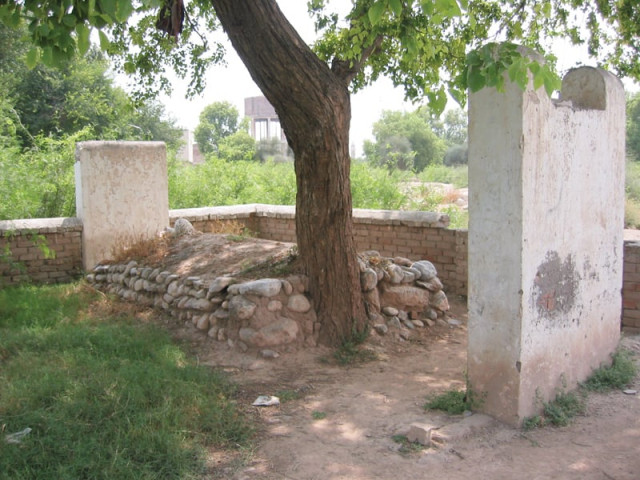Forgotten heroes: The man who would be king wanted to reform Peshawar’s warring tribes
Arbab Behram Khan died fighting the Sikhs in 1831.

Forgotten heroes: The man who would be king wanted to reform Peshawar’s warring tribes
A few kilometres out of Peshawar city, along main Jamrud Road, lies Tehkal Bala village. In its small ancient graveyard is a corner that is marked by an old grave. Its gravestone proclaims it is the last resting place of Arbab Behram Khan, an ardent supporter of Syed Ahmad Barelvi Shaheed who was killed with his amir in the famous battle of Balakot, Mansehra.
It was Friday, May 6, 1831. The stage was set for the battle that would be fought between the Hindustani mujahideen and the Sikh Army.
The Sikh Army had already captured the high ground and had taken positions on the rocky slopes of the Balakot hills just outside the town which was under the mujahideen’s control.
In his famous book, Syed Ahmad Shaheed (1952), Maulvi Ghulam Rasool Mehar describes the scene. “The Sikh Army appeared at the north of Balakot and their numbers were increasing with each movement. They were firing their guns at the town and the mosque where Syed Ahmad had stayed was being hit.”
The mosque was flying three standards. The black banner was Syed Ahmad Barelvi’s grandfather Abul Hassan’s, the second one, also black was of Ibrahim Khan Kherabadi and the third one, of the native mujihideen, was white and red. Syed Ahmad Barelvi had selected his grandfather’s standard to be carried into the battlefield that day and asked him to accompany them, writes Mehar.

Arbab’s body was found a day after the battle and buried, but six months later his remains were taken to his ancestral town Tehkal Bala. PHOTOS: RIAZ AHMAD/EXPRESS
“When Syed Ahmad Barelvi left the mosque and headed toward a group of Sikhs surrounded by his followers, Arbab Behram was running ahead of him like a shield, with a gun in his hand. When his amir sat there, taking cover [behind] a large stone and started firing at the enemy, Behram Khan was spotted on [his] right… engaged in the bloody skirmish with the Sikh infantry and [this] was the last time they were seen alive by anyone.” On the second day, Arbab’s body was found and buried, but six months later his remains were taken to his ancestral town by his son-in-law.
Arbab Behram Khan hailed from the famous Arbab family of Tehkal Bala. He was appointed the head of his Khalil clan after the death of Arbab Sarfaraz Khan but he soon developed differences with Sardar Sultan Muhammad Khan and Pir Muhammad Khan, two of the four Barakzai brothers who ruled Peshawar, and left for Jamrud.
In 1830, when Syed Ahmad Barelvi Shaheed marched on Peshawar after inflicting a crushing defeat on the Barakzai army in the famous battle of Mayar, Mardan, the sardars had no choice but to welcome him to the city and offer him the olive branch in the name of Islamic brotherhood. He accepted.
On this occasion, Arbab Behram Khan was with Syed Ahmad Barelvi. They used the Regi route inhabited by Arbab’s Khalil tribesmen to enter Peshawar. Arbab was not in favour of returning the city to its old rulers and offered that he should be made the ruler of Peshawar as its annual income was estimated at one million rupees, which could be used for jihad.
He offered Syed Ahmad Barelvi 4,000 foot soldiers and assured to pay for all expenses if he was granted Peshawar. He insisted that with the help of his Khalil clan he would be able to keep the Kabuli army at bay and would provide the mujahideen all possible assistance too.
Syed Ahmad Barelvi, who was staying at Gor Ghatri, turned down the offer on the grounds that their goal was not to conquer lands. The return of Peshawar proved to be a real disaster later for the mujahideen.
The Sikhs were a real threat and an organised force in their day. There was no unity among the local population and the local Barakzai rulers of Peshawar were also not able to match them. The Sikh raids played havoc with the villages.
“They burnt houses and plundered them so it was natural that people gathered under the banners of Syed Ahmad Barelvi against the common enemy,” said Humayun Akhund, a Peshawar enthusiast, while talking to The Express Tribune. Arbab Behram Khan drew Syed Ahmad Barelvi’s attention towards the family feuds among the residents of the region and tried to end them by enforcing Sharia rule.
“He was not able to fulfill his dream of reforming Pakhtun society but he played his due role in fighting the common enemy — the Sikh Army — and lost his life to this end,” he said, adding that Arbab Behram was a hero and will remain so, albeit a forgotten hero.
“It was not an easy job as the local rulers tried their best to make life a living hell for those who were the supporters of Syed Ahmad Barelvi, but Arbab Behram accepted this as part of the game and never complained about it.”
Published in The Express Tribune, July 15th, 2014.













COMMENTS
Comments are moderated and generally will be posted if they are on-topic and not abusive.
For more information, please see our Comments FAQ